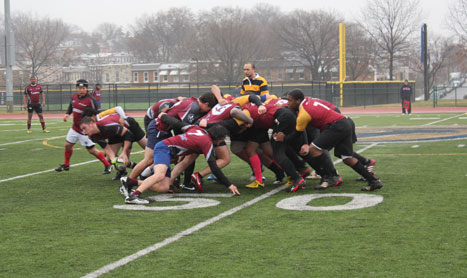(Interpretation of Mark Burke by Roberto Santiago. Voiced by Lucas High.)
WASHINGTON – Mark Burke stood on the sideline, unable to play after getting injured during the first half of a rugby match against Montgomery College*.
But the setback did not dampen Burke’s spirits.
His team, the All Deaf Rugby Football Club – which proudly touts itself as North America’s only deaf men’s club rugby team – would go on to the win the match in February, its first of the 2013 season, 30-10.
The victory, however, was just a bonus for Burke, who is deaf. He formed a rugby team consisting of all deaf players in summer 2012 to play in the Washington Rugby Football Club’s annual sevens tournament.
Less than a year later, teams from around the world are asking Burke’s squad to scrimmage with them.
“Going in, it was going to be one day thing. I didn’t know if anything was going to come of it,” said Burke, who is the athletic director and rugby coach at the Model Secondary School for the Deaf (MSSD), a high school on the Gallaudet University campus.
The sport has not come easy for many on the deaf team, since rugby players traditionally rely heavily on verbal communication. There is no universal sign language for rugby and the signs are constantly evolving.
“It’s a learning curve for us coaches on figuring out how to make rugby deaf friendly,” said Gallaudet doctoral student Roberto Santiago, a coach for both the All Deaf club men’s team and the MSSD high school team. “There’s only been rugby in the deaf community for five years in the modern times. These guys have had to come up with the sign language for the game.”

The coaches observed how the MSSD students were talking about the sport and applied their sign language to the game.
“When Mark started with them, no one knew how to talk about it,” Santiago said. “They figured it out over four, five years and now really I think it’s a very evolved…set of terms that are specific to rugby.”
Even with a stable set of signs, there are still struggles while playing against a hearing team.
All Deaf club member Mike West, playing in his first game against Montgomery College, took the ball and continued to run even though Santiago, who was the referee for the game, had blown the play dead.
After the play was over, Santiago gathered players from both teams for what he called a “teaching moment.” He asked players to put their hands in the air to signal to a deaf ball carrier that the play had ended.
“Obviously communication is very important, and that’s when things have to become very visual,” Burke said.
Burke, who lives in Hyattsville, played rugby for the Frederick Rugby Football Club from 1994-1997. He started the MSSD rugby team in 2009, a year after being named the school’s athletic director.
He realized the potential for an all deaf men’s rugby club in the nation’s capital when MSSD alumni approached him about starting a deaf rugby team.
“I had a lot of alumni coming to me and saying, ‘I want to play rugby.’ And I’d say, ‘Just go join a team,’ he said. “But a lot of them feel like they would be isolated, like they would be the one deaf person. And so we set this up so they could have a place to play.”
Burke, 42, is the oldest player on the team that consists of MSSD alumni, college students and adults from the Washington, D.C., area.
The highest one-day turnout for practice was 25 players in the fall, and the team averages anywhere from six to 15 at their weekly Tuesday and Thursday practices.
Santiago, who serves as the club’s interpreter, has been thrilled with the players’ growth and passion for the game.
“It’s amazing, especially as a hearing person, as sort of an outsider,” Santiago said. “I’m really proud of what we’re doing.”
To help the All Deaf club get off the ground, the Washington Rugby Club has been practicing with the team, providing an adequate amount of players for practices.
And the support has continued to swell. Many clubs in the area have offered to play against the All Deaf club, including the Washington Renegades and American University.
“I never could’ve imagined how much interest there would be in this club,” Burke said. “I’m really amazed that in the rugby community, the hearing teams are really very proud of what we’ve done. I think they’re almost more proud of us being the first deaf team than the deaf people are.”
The All-Deaf Club has gone 2-3 since the friendly against Montgomery College, facing mostly Division III competition in the Potomac Rugby Union. The team plays PAX River in Southern Maryland on Saturday, the Quantico Marines on May 4 and ends its spring season at the PBR Cup in Columbia on May 25.
Burke believes his team will grow into a mainstay in the rugby community.
The club’s ultimate goal is to qualify for the deaf rugby world championships in London in 2015. The club is also hoping to start a deaf women’s team.
“Washington, D.C., really is the perfect place for deaf rugby, because there are so many deaf people in this area,” Burke said. “I don’t want this club just to be focused on college students. I want any adult who wants to play rugby to come and find us.”
*Clarification: an earlier version of this story said Mark Burke suffered a concussion during a game against Montgomery College. Burke was not officially diagnosed with a concussion.


You must be logged in to post a comment.